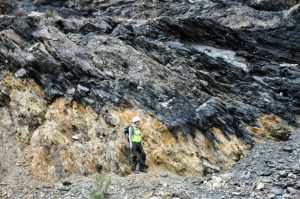Press release I July 2019 I The EU-funded INFACT project recently collected a set of new geoscience data through airborne electromagnetic (AEM) surveys in southern Spain. The Horizon 2020 project aims to develop first-of-its-kind European “reference sites” for non-invasive mineral exploration technologies in three EU countries.
INFACT is looking at two main aspects of exploration technologies:
- Technical performance: how a technology contributes to the discovery of a new deposit;
- Socio-environmental: what is the impact of a technology on the environment and how is it perceived by the local community.
INFACT geophysical surveys
Airborne electromagnetics (AEM) is a non-invasive mineral exploration technique, minimising the environmental impact related to exploration activities, that can detect variations in the electrical conductivity of rocks, sediments and waters to a depth of several hundred meters. The INFACT consortium conducted a series of AEM surveys across Europe between summer 2018 and April 2019. The recent surveys in Spain were led by Geotech Ltd., in collaboration with Atalaya Mining, Cobre Las Cruces, Aarhus Geophysics, Geognosia, and coordinated by the Helmholtz Institute Freiberg for Resource Technology.
In the coming months, the AEM data will be integrated with other datasets collected in order to build a strong knowledge of the under-cover geology.
Social perception of mineral exploration
INFACT partners have developed a stakeholder engagement process based on preliminary scientific research on social acceptance of mining and mineral exploration for different social contexts: The European Union as a whole, and the INFACT reference countries, regions and sites based in Finland, Germany and Spain. Across the three countries, local residents and national stakeholders were informed, consulted, or invited to collaborate in the exploration campaign, building thus trust around the project’s activities.
In Spain, two public events were organised nearby the reference area in Andalusia, inviting high-school students to follow live the geoscience data acquisition. Beyond the student engagement activities, the INFACT team met with professionals from the mining and exploration sector, representatives of regional institutions, and representatives from the International University of Andalusia.
Project’s outcomes

INFACT aims at developing a selection of innovative, non-invasive exploration technologies in an industry-relevant environment to raise their Technology Readiness Level, leading to direct benefits for Society.
The data collected during the project lifetime will be consultable by the public and displayed on an online interactive platform.
More information is available on the project website: www.infactproject.eu
The INFACT partners:
Agencia de Innovation y Desarrollo (IDEA), Anglo American Sakatti Oy, Aarhus Geophysics, Atalaya Mining, ATClave, Cobre las Cruces, Dialogik, European Federation of Geologists (EFG), Fraunhofer IAO, GALSA (Geotech), Geognosia, Helmholtz Institute Freiberg for Resource Technology (HIF) at Helmholtz-Zentrum Dresden-Rossendorf (coordinator), Oulu Mining School, SRK Exploration Services, Supracon, SYKE, University of Eastern Finland.
Photo credit: Robert De La Rosa and Leila Ajjabou
_______________________________________________________________________________________
For more information:
Helmholtz-Zentrum Dresden-Rossendorf:
Leila Ajjabou I Project coordinator
Phone: +49 (0) 351 260-4461 | Email: l.ajjabou@hzdr.de
Dr. Richard Gloaguen | Head Exploration Division
Phone: +49 (0) 351 260-4424 | Email: r.gloaguen@hzdr.de
European Federation of Geologists
Marco Komac I Leader WP7 – Impact creation
Email: efg.externalrelations@eurogeologists.eu
Anita Stein I EFG Communication Manager
Email: anita.stein@eurogeologists.eu

